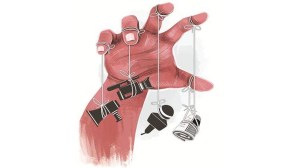Something about the rupee
What excites Indians? Well, money, of course, and a robust display of national muscle. Think of two current national obsessions in an ever...

What excites Indians? Well, money, of course, and a robust display of national muscle. Think of two current national obsessions in an ever-changing litany and, as likely as not, you will come up with Kaun Banega Crorepati 8212; and the travails of the rupee.
Now the pull that KBC8217; exercises on our vicarious little minds has been endlessly dissected. Every time somebody walks away with a jaunty step and a 6.4 lakh cheque warming his pocket, one sighs in the knowledge that there, but for the neglect of God, go I.
For the majority of us no similar empathy attaches to the rupee8217;s fortunes, though of course we can feel free to kick ourselves if we have freshly returned from a stint abroad and surrendered our greenbacks at the rupee8217;s highest rate in a long time and so got fewer rupees for our precious dollars. So whence our fascination for the currency8217;s arcane gyrations? Why does the quot;plummetingquot; rupee make us solemnly mourn every 12 paise drop?
Partly it is indeed the pride thing. A strong currency signifies that our economy is in sound shape in relation to others. It is, we know, a sign of strong economic quot;fundamentalsquot;. Currencies are those kinds of things. We know how attached the Germans are to their beloved Deutsche Mark and how reluctant to relinquish it in favour of the euro which has moreover had the bad fortune to languish vis-a-vis the dollar since its birth last year.
But the pride thing flies only up to a point. We may not know quite what it is but we sense that we stand to lose in some way from a weak currency. The divergence of views between economists who tell us a weakening rupee is no bad thing and the people at large or consumers who are not convinced has some basis in fact.
The fact is that what is good for the economy is not necessarily good for individuals. Patriotism and commitment to a free market means one can hardly disagree with the economists that the Reserve Bank should save its energies or at least expend them in a better way in shoring up the rupee. But it has to be acknowledged that people at large are not really the beneficiaries of a weakening rupee.
In what ways is a cheap rupee good for the economy, after all? In that it gives exports a leg up and protects domestic industry against imports. This comes in especially handy at a time when the economy is seen to be set on the path to high growth. When the rupee weakens, an export that used to cost, say, Rs 100 now costs fewer dollars at the same rupee price. Cheaper exports sell more. Likewise, dollar-denominated imports cost more in rupees than they used to. So exports tend to rise and imports to taper off.
Of course there are imports that will be made irrespective of their cost. Oil imports are an obvious case in point, and they are the single largest item of import in value. This is what is now worrying everybody because high oil prices, combined with a weak rupee, can add up to 25 per cent this year to the oil import bill.
But other imports are more price elastic. It is the hope of those in favour of letting the market rule that the import bill will be contained as demand falls for imports for which Indians have acquired an increased appetite as physical restrictions on imports are progressively removed under India8217;s international trade commitments.
This is all to the good. Booming exports are a fine thing, both for national pride and the national kitty. They put our balance of payments in good shape and earn us foreign exchange. It is hardly coincidental that exports are up by nearly 30 per cent after being in the doldrums for a longish time.
As for import containment, the producer and consumer views on them must differ. In macroeconomic terms, we can8217;t afford to live beyond our means by spending far more foreign exchange on imports than we are able to earn through exports. Protection is good for our producers who have in recent years faced quite an uphill task in fighting off quality imports.
For the free market wallahs, who dislike outright prohibition of imports, the market is a good regulating mechanism whereby a weak rupee automatically restricts import demand. But some sympathy is due to the consumer who would really rather not do without the fine imports to which he at last has access and settle for domestically made substitutes which may be less value for money or which may not even exist.
Even for industry, a weakening rupee presents a mixed picture because they need to import for production too and their costs rise. This results in domestic price rises or quot;imported inflationquot;. In a liberalised economic regime, the impact of such price rises is greater because the import intensity of production rises as importers no longer need to source everything from home and buy from wherever their needs are best met.
All these are obviously matters that agitate the Reserve Bank which has faced a barrage of 8212; justifiable 8212; criticism in recent weeks. Aside from the point that exports benefit from a weaker exchange rate, the bank has come under attack for several reasons. A prominent one is that its reactions are knee-jerk and have no specified aim. Also, since inflation in India is higher than in the industrial economies, the rupee will inevitably head southward in the long term. The only thing the central bank should do is to calibrate this fall so it is not too sudden or sharp.
What has come under attack is the effectiveness of the RBI8217;s attempts and the effect of rising interest rates on economic growth. The idea of raising interest rates is to restrict money supply, by making borrowings costlier, and prevent inflation. They are meant to attract foreign capital and to dissuade it from leaving. But precisely by slowing down the circulation of money, they stunt growth.
These are valid criticisms though the bank is unlikely to be deterred especially with the pricey oil-weak rupee combination.
Indians, it seems, will have to do with feeling poorer when travelling or studying abroad. Wonder if vicarious Crorepati thrills can compensate.
- 01
- 02
- 03
- 04
- 05































